

Reference Manager. How to (seriously) read a scientific paper. Adam Ruben’s tongue-in-cheek column about the common difficulties and frustrations of reading a scientific paper broadly resonated among Science Careers readers.
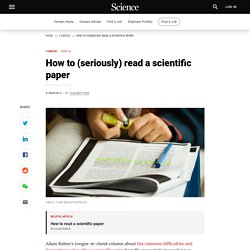
Many of you have come to us asking for more (and more serious) advice on how to make sense of the scientific literature, so we’ve asked a dozen scientists at different career stages and in a broad range of fields to tell us how they do it. Although it is clear that reading scientific papers becomes easier with experience, the stumbling blocks are real, and it is up to each scientist to identify and apply the techniques that work best for them. The responses have been edited for clarity and brevity. How do you approach reading a paper? I start by reading the abstract.
More from our How-To series I first get a general idea by reading the abstract and conclusions. If I’m aiming to just get the main points, I’ll read the abstract, hop to the figures, and scan the discussion for important points. All the time. Yes, many times. How to Read a Journal Article. Journal articles can be challenging to read, but most contain many of the same components.
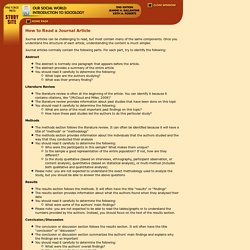
Once you understand the structure of each article, understanding the content is much simpler. Journal articles normally contain the following parts. For each part, try to identify the following: Abstract The abstract is normally one paragraph that appears before the article. Literature Review. Research Strategies - AAA Shared Resource Guide - LibGuides at Indiana University-Purdue University Indianapolis. Before you start entering any search terms, spend a few minutes trying to think of as many relevant terms and combinations of terms as you can.
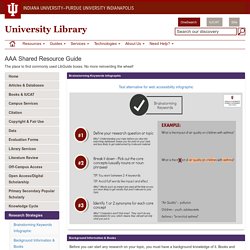
This will help you to avoid getting stuck in a rut with the first terms that come to mind. If you need help in coming up with terms, you may want to try the "Thesaurus" or "Subject Headings" features in the database you've chosen. Check out the "Help" or "Search Tips" to learn some of the search features specific to that database. Most databases provide similar features, but the methods may vary. Some common tricks: truncation = To use truncation, enter the root of a search term and replace the ending with an * (asterisk). Try the databases' Advanced Search feature, which usually gives you the ability to search multiple fields (author, title, keyword, subject, etc) with one search and may offer additional ways to expand or limit your search. If your first search strategy does not work, try another approach.
400+ Tools and innovations in scholarly communication - Google Sheets. Digital Research Tools. How Google Docs' research tool removes drudgery from reports and presentations. You’re frantically racing toward a deadline to complete a multi-page report or slideshow presentation, but research is slowing you down.
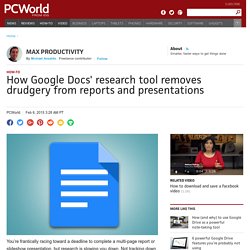
Not tracking down the information so much as the constant bouncing between your work document and web browser, and cycling through the confusing morass of open tabs to find that webpage or image you need. If you use Google’s free office suite, there’s an easier way—a built in research tool that lets you search for the information you need and easily add it to the Google Doc or Google Slide you’re working on without having to leave the page. Here’s how to get started. Bibliographic management. Citable (Chrome web extension) Search the citations of other students: EasyBib: Free Bibliography Maker - MLA, APA, Chicago citation styles.
ReadCube for Researchers. SciLit - Scientific & Scholarly Literature. ScienceOpen. Research Pad. Open Access Library (OALib) 6 of The Best Web Tools for Organizing and Managing Citations, References and Bibliographies. April 1, 2015 One of the onerous parts in essay and academic writing is the bibliography section.
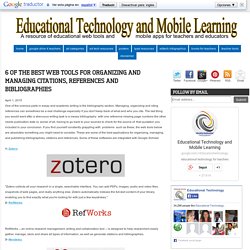
Managing, organizing and citing references can sometimes be a real challenge especially if you don't keep track of what and who you cite. The last thing you would want after a strenuous writing task is a messy bibliography with one reference missing page numbers the other needs publication date or, worse of all, having to go back to your sources to check for the source of that quotation you included in your conclusion. If you find yourself constantly grappling with problems such as these, the web tools below are absolutely something you might need to consider. These are some of the best applications for organizing, managing, and publishing bibliographies, citations and references.
Some of these softwares are integrated with Google Scholar. 1- Zotero "Zotero collects all your research in a single, searchable interface. 5- EasyBib. JSTOR. Oxford Journals. Journals. Welcome to HighWire. Home: ingentaconnect. CiNii Articles - National Institute of Informatics. DeepDyve - Your Personal Research Library. Search Credible. Science, health and medical journals, full text articles and books.
Free of Charge Research. The University of Auckland - Libraries and Learning Services. Opening up education through innovation. SpringerOpen. Grey Literature. Academic Search Engines. Free e-books. Free Australian e-books. Online Courses & Lectures.